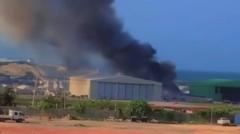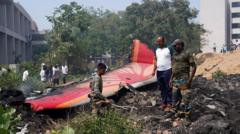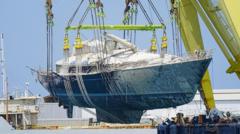Following protests and irregularities in sales, President Barrow insists on transparency as the nation seeks accountability for misused property.
**Gambia's Investigation Into Former President Jammeh's Disputed Asset Sales**

**Gambia's Investigation Into Former President Jammeh's Disputed Asset Sales**
Amid public outcry, the Gambian government investigates alleged misappropriation of former leader Yahya Jammeh's luxury assets.
In a recent development marking a significant move towards accountability, the Gambian government has opened an investigation into the controversial sale of assets belonging to former President Yahya Jammeh. This decision comes after a surge of public concern and protests regarding the propriety of the sales involving luxury vehicles, livestock, and boats, which were reportedly facilitated while an investigation into Jammeh's wealth was still ongoing.
An investigative piece published in a local newspaper, Republic, highlighted alleged misconduct involving senior officials who reportedly sold the seized assets to themselves and close associates at prices well below market value. This report ignited public outrage, particularly among the youth, leading to protests in the capital city of Banjul. Although some demonstrators, including journalists, were momentarily detained, they were later released.
In a televised address on Wednesday, President Adama Barrow committed to ensuring "full transparency" in the investigation, emphasizing that the assets in question rightfully belong to the Gambian people. The president affirmed that he would push for accountability and corrective measures if any wrongdoing is discovered. This follows a prior investigation known as the Janneh Commission, which concluded in 2019 and recommended the confiscation of assets acquired unlawfully by Jammeh, including an estimated $360 million in government funds.
Despite the government's efforts to clarify the situation by releasing a list of already sold assets—comprising various items from luxury cars and livestock to construction machinery—certain high-profile assets, such as Jammeh’s customized Rolls Royce and Bentley, were conspicuously absent. Their current status remains unclear, further intensifying public suspicion and distrust towards the government's handling of the asset recovery process.
Barrow mentioned that parliamentary hearings and inquiries by the National Audit Office are underway to scrutinize the asset sale processes. However, skepticism persists, particularly from opposition leaders and activist groups who demand an independent investigation. Yayah Sanyang, an opposition MP, accused the parliament of being filled with members loyal to the ruling party, thereby undermining the integrity of the inquiry.
Attorney General and Justice Minister, alongside Barrow, stated that the asset sales adhered to a "legally grounded process," and pledged to uphold public interests throughout the investigation. As tensions rise amidst the scrutiny of Jammeh's alleged corrupt legacy, the government asserts its commitment to address any lapses while maintaining its stance on the legitimacy of its actions.
This investigation comes in the wake of actions by the U.S. government to seize a mansion in Maryland traced back to Jammeh’s illicit earnings and affiliations to over 280 properties and numerous bank accounts amassed during his tenure. With public pressure mounting for accountability, the future of the investigation may hold significant ramifications for Gambia's political landscape and the ongoing quest for justice following years of authoritarian rule.
An investigative piece published in a local newspaper, Republic, highlighted alleged misconduct involving senior officials who reportedly sold the seized assets to themselves and close associates at prices well below market value. This report ignited public outrage, particularly among the youth, leading to protests in the capital city of Banjul. Although some demonstrators, including journalists, were momentarily detained, they were later released.
In a televised address on Wednesday, President Adama Barrow committed to ensuring "full transparency" in the investigation, emphasizing that the assets in question rightfully belong to the Gambian people. The president affirmed that he would push for accountability and corrective measures if any wrongdoing is discovered. This follows a prior investigation known as the Janneh Commission, which concluded in 2019 and recommended the confiscation of assets acquired unlawfully by Jammeh, including an estimated $360 million in government funds.
Despite the government's efforts to clarify the situation by releasing a list of already sold assets—comprising various items from luxury cars and livestock to construction machinery—certain high-profile assets, such as Jammeh’s customized Rolls Royce and Bentley, were conspicuously absent. Their current status remains unclear, further intensifying public suspicion and distrust towards the government's handling of the asset recovery process.
Barrow mentioned that parliamentary hearings and inquiries by the National Audit Office are underway to scrutinize the asset sale processes. However, skepticism persists, particularly from opposition leaders and activist groups who demand an independent investigation. Yayah Sanyang, an opposition MP, accused the parliament of being filled with members loyal to the ruling party, thereby undermining the integrity of the inquiry.
Attorney General and Justice Minister, alongside Barrow, stated that the asset sales adhered to a "legally grounded process," and pledged to uphold public interests throughout the investigation. As tensions rise amidst the scrutiny of Jammeh's alleged corrupt legacy, the government asserts its commitment to address any lapses while maintaining its stance on the legitimacy of its actions.
This investigation comes in the wake of actions by the U.S. government to seize a mansion in Maryland traced back to Jammeh’s illicit earnings and affiliations to over 280 properties and numerous bank accounts amassed during his tenure. With public pressure mounting for accountability, the future of the investigation may hold significant ramifications for Gambia's political landscape and the ongoing quest for justice following years of authoritarian rule.





















